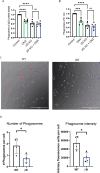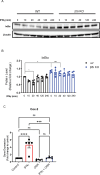This is a preprint.
Key features of the innate immune response is mediated by the immunoproteasome in microglia
- PMID: 38883799
- PMCID: PMC11177974
- DOI: 10.21203/rs.3.rs-4467983/v1
Key features of the innate immune response is mediated by the immunoproteasome in microglia
Abstract
Microglia are the resident immune cells of the central nervous system (CNS). We and others have shown that the inflammatory response of microglia is partially regulated by the immunoproteasome, an inducible form of the proteasome responsible for the generation of major histocompatibility complex (MHC) class I epitopes. While the role of the proteasome in the adaptive immune system is well established, emerging evidence suggests the immunoproteasome may have discrete functions in the innate immune response. Here, we show that inhibiting the immunoproteasome reduces the IFNγ-dependent induction of complement activator C1q, suppresses phagocytosis, and alters the cytokine expression profile in a microglial cell line and microglia derived from human inducible pluripotent stem cells. Moreover, we show that the immunoproteasome regulates the degradation of IκBα, a modulator of NF-κB signaling. Finally, we demonstrate that NADH prevents induction of the immunoproteasome, representing a potential pathway to suppress immunoproteasome-dependent immune responses.
Keywords: Complement; Cytokines; Immunoproteasome; Innate immunity; Microglia; NFκ-B; ONX-0914; Phagocytosis.
Conflict of interest statement
Neither I nor my family members have a financial interest in any commercial product, service, or organization providing financial support for this research.
Figures





References
Publication types
Grants and funding
LinkOut - more resources
Full Text Sources
Research Materials

